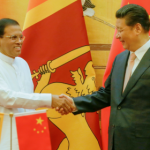The ongoing political crisis in Sri Lanka, where an elected prime minister was sacked, has a larger Chinese design stamped all over it. First, the new, illegal appointee, Prime Minister Mahinda Rajapaksa, is known for his pro-China tilt. The Sri Lankan government, during Rajapaksa’s earlier tenure as president (2005-15), undertook multi-billion dollar projects funded by China, which have pushed the country into a debt-trap, eventually forcing the island nation to cede sovereignty over a port to China. Second, on a more political note, China allegedly financed Rajapaksa’s unsuccessful presidential campaign of 2015[1]. It was also the first major country to acknowledge him now as Sri Lanka’s arbitrarily reinstated prime minister[2]. (Pakistan, a close ally of China, is one of the few countries to have followed suit in this[3].) In July 2018, Chinese President Xi Jinping offered a $295 million grant to Sri Lankan President Maithripala Sirisena for ‘a project of his choice’[4] – interpreted by some observers as a bribe.
This is not the first time a China-backed regime change has happened in a country dependent on Chinese investments and weapons. Maldives, Zimbabwe and Pakistan have already experienced this dimension of Chinese investments, with governments being toppled to bring in a more pro-China ruler.
In the case of the Maldives, elected President Mohamed Nasheed was forced to ‘resign at gunpoint’ in 2012[5] and parliamentarians and judges refusing to toe the new regime’s line were arrested. These events coincide with increasing Chinese economic presence in the Maldives[6]: it has made investments worth over $1 billion in the archipelago, with precious few details available of the terms and conditions accompanying them.
The 2017 coup in Zimbabwe, in which long-time strongman Robert Mugabe was ousted, was executed after its army chief visited China. Zimbabwe relies on China for foreign investment and military hardware.
As for Pakistan, China is its top supplier of military hardware and leading investor. What it needs to have in place there is a pliant ruler who is hostile to India. The 2018 general election of Pakistan was manipulated by the military[7], its real boss, to deliver precisely the desired outcome. The incumbent Prime Minister Nawaz Sharif, who had shown an interest in forging normal ties with India, was forced out and then arrested on flimsy charges to pave the way for Imran Khan, who has leanings towards anti-India religious extremists.
As China’s Belt and Road Initiative investments expand geographically, such interventions are going to become more widespread – and not just for regime change. A Chinese hand also seems to be active in the ongoing turmoil in West Asia, a region important to the world’s largest oil importer. China has made known its intention to import oil from Iran despite American sanctions, helping stabilise a regime which the U.S. wants to remove. It is playing a similar role in oil-rich Venezuela as well, which is half a world away. Meanwhile, it had also offered to buy the entire 5% stake that was being offered by Saudi Aramco for its proposed IPO[8] and has invested in the UAE’s oil industry as well. These moves could be a part of China’s bid to internationalise its currency and present itself as a viable alternative to the U.S. in the region. As China becomes stronger, it is starting to mirror the behaviour of former colonial powers whose investments were followed by political interference.
Neelam Deo is Director, Gateway House.
Amit Bhandari is Fellow, Energy and Environment Studies, Gateway House.
This blog was exclusively written for Gateway House: Indian Council on Global Relations. You can read more exclusive content here.
For interview requests with the author, or for permission to republish, please contact outreach@gatewayhouse.in
© Copyright 2018 Gateway House: Indian Council on Global Relations. All rights reserved. Any unauthorized copying or reproduction is strictly prohibited.


